-
抗体試薬
- フローサイトメトリー用試薬
-
ウェスタンブロッティング抗体試薬
- イムノアッセイ試薬
-
シングルセル試薬
- BD® AbSeq Assay
- BD Rhapsody™ Accessory Kits
- BD® OMICS-One Immune Profiler Protein Panel
- BD® Single-Cell Multiplexing Kit
- BD Rhapsody™ TCR/BCR Next Multiomic Assays
- BD Rhapsody™ Targeted mRNA Kits
- BD Rhapsody™ Whole Transcriptome Analysis (WTA) Amplification Kit
- BD® OMICS-Guard Sample Preservation Buffer
- BD Rhapsody™ ATAC-Seq Assays
- BD® OMICS-One Protein Panels
-
細胞機能評価のための試薬
-
顕微鏡・イメージング用試薬
-
細胞調製・分離試薬
-
- BD® AbSeq Assay
- BD Rhapsody™ Accessory Kits
- BD® OMICS-One Immune Profiler Protein Panel
- BD® Single-Cell Multiplexing Kit
- BD Rhapsody™ TCR/BCR Next Multiomic Assays
- BD Rhapsody™ Targeted mRNA Kits
- BD Rhapsody™ Whole Transcriptome Analysis (WTA) Amplification Kit
- BD® OMICS-Guard Sample Preservation Buffer
- BD Rhapsody™ ATAC-Seq Assays
- BD® OMICS-One Protein Panels
- Japan (Japanese)
-
Change country/language
Old Browser
Looks like you're visiting us from United States.
Would you like to stay on the current country site or be switched to your country?
BD Pharmingen™ Alexa Fluor® 488 Mouse anti-EZH2
クローン 11/EZH2 (RUO)

LEFT: Flow cytometric analysis of EZH2 expression in a human cell line. Jurkat cells (ATCC, TIB-152™) were harvested, fixed in BD Cytofix™ Fixation Buffer (Cat. No. 554655), permeabilized with BD Phosflow™ Perm/Wash Buffer I (Cat. No. 557885) and stained with matching concentrations of either Alexa Fluor® 488 Mouse IgG1, κ Isotype Control (Cat. No. 557721; dashed line histogram) or Alexa Fluor® 488 Mouse anti-EZH2 antibody (Cat. No. 562479; solid line histogram). The fluorescence histograms were derived from gated events with the forward and side light-scatter characteristics of viable Jurkat cells. Flow cytometry was performed using a BD FacsCanto™ II Flow Cytometer System.
RIGHT: Immunoflourescent staining and image analysis of EZH2 expression in a human cell line. HeLa cells (ATCC, CCL-2™) were fixed with BD Cytofix™ Fixation Buffer (Cat. No. 554655), permeabilized with 0.1% Triton™-X 100 (Sigma Cat. No. X-100), and stained with Alexa Fluor® 488 Mouse anti-EZH2 monoclonal antibody (Cat. No. 562479; pseudo colored green) at 10 μg/mL. BD Pharmingen™ Hoechst 33342 solution (Cat. No. 561908; pseudo-colored blue) was used for counterstaining. The image was captured using a BD Pathway™ 435 Cell Analyzer and merged using BD Attovision™ Software.

.png)
LEFT: Flow cytometric analysis of EZH2 expression in a human cell line. Jurkat cells (ATCC, TIB-152™) were harvested, fixed in BD Cytofix™ Fixation Buffer (Cat. No. 554655), permeabilized with BD Phosflow™ Perm/Wash Buffer I (Cat. No. 557885) and stained with matching concentrations of either Alexa Fluor® 488 Mouse IgG1, κ Isotype Control (Cat. No. 557721; dashed line histogram) or Alexa Fluor® 488 Mouse anti-EZH2 antibody (Cat. No. 562479; solid line histogram). The fluorescence histograms were derived from gated events with the forward and side light-scatter characteristics of viable Jurkat cells. Flow cytometry was performed using a BD FacsCanto™ II Flow Cytometer System.
RIGHT: Immunoflourescent staining and image analysis of EZH2 expression in a human cell line. HeLa cells (ATCC, CCL-2™) were fixed with BD Cytofix™ Fixation Buffer (Cat. No. 554655), permeabilized with 0.1% Triton™-X 100 (Sigma Cat. No. X-100), and stained with Alexa Fluor® 488 Mouse anti-EZH2 monoclonal antibody (Cat. No. 562479; pseudo colored green) at 10 μg/mL. BD Pharmingen™ Hoechst 33342 solution (Cat. No. 561908; pseudo-colored blue) was used for counterstaining. The image was captured using a BD Pathway™ 435 Cell Analyzer and merged using BD Attovision™ Software.

LEFT: Flow cytometric analysis of EZH2 expression in a human cell line. Jurkat cells (ATCC, TIB-152™) were harvested, fixed in BD Cytofix™ Fixation Buffer (Cat. No. 554655), permeabilized with BD Phosflow™ Perm/Wash Buffer I (Cat. No. 557885) and stained with matching concentrations of either Alexa Fluor® 488 Mouse IgG1, κ Isotype Control (Cat. No. 557721; dashed line histogram) or Alexa Fluor® 488 Mouse anti-EZH2 antibody (Cat. No. 562479; solid line histogram). The fluorescence histograms were derived from gated events with the forward and side light-scatter characteristics of viable Jurkat cells. Flow cytometry was performed using a BD FacsCanto™ II Flow Cytometer System.
RIGHT: Immunoflourescent staining and image analysis of EZH2 expression in a human cell line. HeLa cells (ATCC, CCL-2™) were fixed with BD Cytofix™ Fixation Buffer (Cat. No. 554655), permeabilized with 0.1% Triton™-X 100 (Sigma Cat. No. X-100), and stained with Alexa Fluor® 488 Mouse anti-EZH2 monoclonal antibody (Cat. No. 562479; pseudo colored green) at 10 μg/mL. BD Pharmingen™ Hoechst 33342 solution (Cat. No. 561908; pseudo-colored blue) was used for counterstaining. The image was captured using a BD Pathway™ 435 Cell Analyzer and merged using BD Attovision™ Software.
.png)

BD Pharmingen™ Alexa Fluor® 488 Mouse anti-EZH2
.png)
Regulatory Statusの凡例
Any use of products other than the permitted use without the express written authorization of Becton, Dickinson and Company is strictly prohibited.
Preparation and Storage
推奨アッセイ手順
• This antibody conjugate is suitable for intracellular staining of human cell lines using BD Cytofix™ Fixation Buffer. BD Phosflow™
Perm/Wash Buffer I (Cat. No. 557885) and BD Phosflow™ Perm Buffer III (Cat. No.558050) can be used with this antibody conjugate.
• The Bioimaging protocol can be found at http://www.bdbiosciences.com/support/resources/protocols/ceritifed_reagents.jsp.
Product Notices
- This reagent has been pre-diluted for use at the recommended Volume per Test. We typically use 1 × 10^6 cells in a 100-µl experimental sample (a test).
- This reagent has been pre-diluted for use at the recommended Volume per Test when following the Recommended Assay Procedure. A Test is typically ~10,000 cells cultured in a well of a 96-well imaging plate.
- An isotype control should be used at the same concentration as the antibody of interest.
- Alexa Fluor® 488 fluorochrome emission is collected at the same instrument settings as for fluorescein isothiocyanate (FITC).
- For fluorochrome spectra and suitable instrument settings, please refer to our Multicolor Flow Cytometry web page at www.bdbiosciences.com/colors.
- The Alexa Fluor®, Pacific Blue™, and Cascade Blue® dye antibody conjugates in this product are sold under license from Molecular Probes, Inc. for research use only, excluding use in combination with microarrays, or as analyte specific reagents. The Alexa Fluor® dyes (except for Alexa Fluor® 430), Pacific Blue™ dye, and Cascade Blue® dye are covered by pending and issued patents.
- Caution: Sodium azide yields highly toxic hydrazoic acid under acidic conditions. Dilute azide compounds in running water before discarding to avoid accumulation of potentially explosive deposits in plumbing.
- Alexa Fluor® is a registered trademark of Molecular Probes, Inc., Eugene, OR.
- Source of all serum proteins is from USDA inspected abattoirs located in the United States.
- Triton is a trademark of the Dow Chemical Company.
- All other brands are trademarks of their respective owners.
- Please refer to www.bdbiosciences.com/us/s/resources for technical protocols.
関連製品

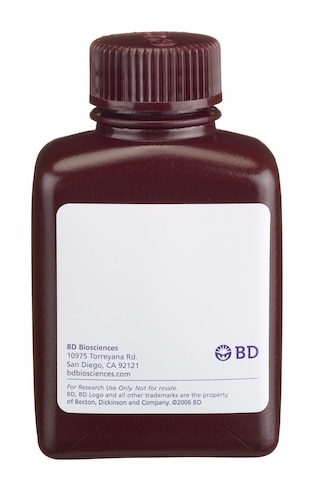
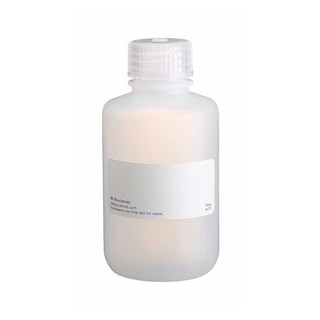
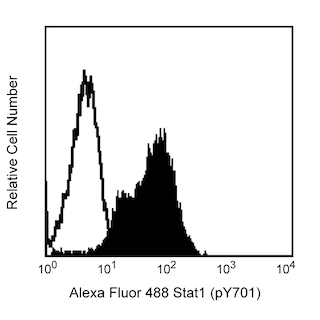
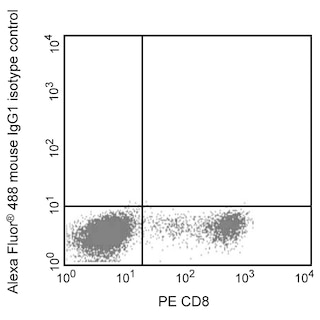
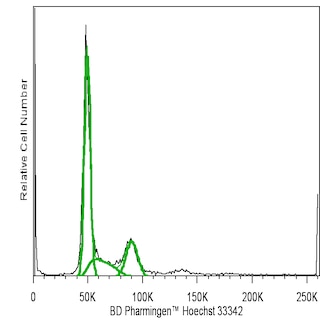
最近閲覧済み
The 11/EZH2 monoclonal antibody specifically binds to the methyltransferase, EZH2 (Enhancer of Zeste Homolog 2). EZH2 is a human homologue of Drosophila's Enhancer of zeste gene, an important regulator of homeobox gene expression. The EZH2 protein has a predicted molecular weight of ~85 kDa. EZH2 is a member of the Polycomb group (PcG) of proteins that are essential for the maintenance, but not initiation, of the transcriptionally repressed state of certain developmental genes. PcG proteins are a structurally diverse group of proteins with conserved functions from fly to human cells. PcG family proteins form multimeric complexes that regulate the expression of genes involved in cell cycle, DNA repair and differentiation. Specifically, EZH2 is a core enzymatic component of PRC2 (polycomb repressive complex 2). EZH2 is expressed in some lymph node follicular T cells and B cells. Thymocytes differentially express EZH2 at various stages during T-cell maturation. EZH2 interacts with multiple signaling proteins, including Vav, that are involved in lymphocyte development and activation. It is highly expressed in a variety of tumors including lymphomas as well as breast and prostate cancers. EZH2 is important in the self renewal and proliferation of numerous stem cell types including fetal hematopoietic stem cells, muscle satellite cells, hepatic stem/progenitor cells, neural stem cells, basal cell progenitors in the developing epidermis, embryonic stem cells, and some cancer stem cells.
Development References (10)
-
Ezhkova E, Pasolli HA, Parker JS, et al. Ezh2 orchestrates gene expression for the stepwise differentiation of tissue-specific stem cells. Cell. 2009; 136(6):1122-1135. (Biology). View Reference
-
Juan AH, Derfoul A, Feng X, et al. Polycomb EZH2 controls self-renewal and safeguards the transcriptional identity of skeletal muscle stem cells. Genes Dev. 2011; 25(8):789-794. (Biology). View Reference
-
Kikuchi J, Kinoshita I, Shimizu Y, et al. Distinctive expression of the polycomb group proteins Bmi1 polycomb ring finger oncogene and enhancer of zeste homolog 2 in nonsmall cell lung cancers and their clinical and clinicopathologic significance. Cancer. 2010; 116(12):3015-3024. (Clone-specific: Immunohistochemistry, Western blot). View Reference
-
Mochizuki-Kashio M, Mishima Y, Miyagi S, et al. Dependency on the polycomb gene Ezh2 distinguishes fetal from adult hematopoietic stem cells. Blood. 2011; 118(25):6553-6561. (Biology). View Reference
-
Raaphorst FM, Otte AP, van Kemenade FJ. Distinct BMI-1 and EZH2 expression patterns in thymocytes and mature T cells suggest a role for Polycomb genes in human T cell differentiation. J Immunol. 2001; 166(10):5925-5934. (Biology). View Reference
-
Shen X, Liu Y, Hsu YJ, et al. EZH1 mediates methylation on histone H3 lysine 27 and complements EZH2 in maintaining stem cell identity and executing pluripotency. Mol Cell. 2008; 32(4):491-502. (Biology). View Reference
-
Simon JA, Lange CA. Roles of the EZH2 histone methyltransferase in cancer epigenetics. Mutat Res. 2008; 647(1-2):21-29. (Biology). View Reference
-
Su IH, Dobenecker MW, Dickinson E, et al. Polycomb group protein ezh2 controls actin polymerization and cell signaling. Cell. 2005; 121(3):425-436. (Biology). View Reference
-
Wolters T, Vissers KJ, Bangma CH, Schroder FH, van Leenders GJ. The value of EZH2, p27(kip1), BMI-1 and MIB-1 on biopsy specimens with low-risk prostate cancer in selecting men with significant prostate cancer at prostatectomy. BJU Int. 2009; 106(2):280-286. (Clone-specific: Immunohistochemistry). View Reference
-
van Kemenade FJ, Raaphorst FM, Blokzijl T. Coexpression of BMI-1 and EZH2 polycomb-group proteins is associated with cycling cells and degree of malignancy in B-cell non-Hodgkin lymphoma. 2001; 97(12):3896-3901. (Biology). View Reference
Please refer to Support Documents for Quality Certificates
Global - Refer to manufacturer's instructions for use and related User Manuals and Technical data sheets before using this products as described
Comparisons, where applicable, are made against older BD Technology, manual methods or are general performance claims. Comparisons are not made against non-BD technologies, unless otherwise noted.
For Research Use Only. Not for use in diagnostic or therapeutic procedures.
